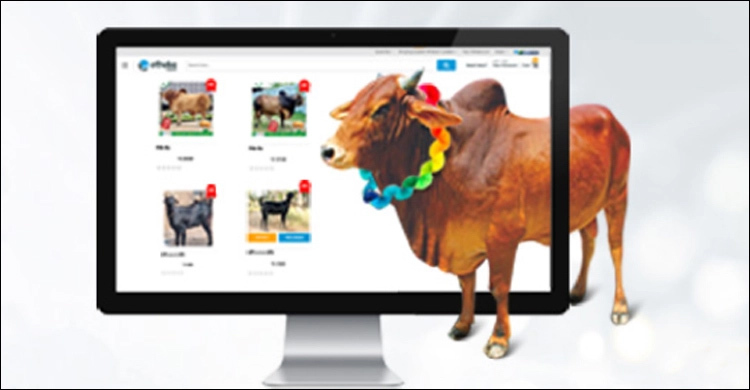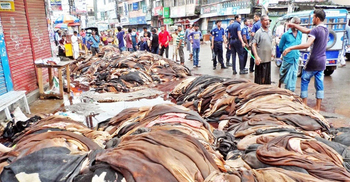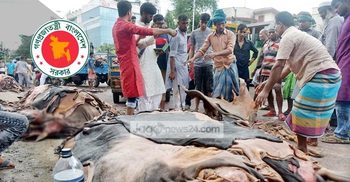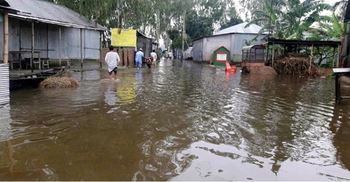Online apps reshaping cattle markets ahead of Eid

With the occasion of sacrifice -- Eid-ul-Azha -- only days away, cattle markets have sprung across the country both in traditional and digital ways but the turnout of buyers is still low apparently fearing the transmission of coronavirus.
To ease the hassle of traders, numerous online cattle markets have started operating. What is more interesting this year that the government endorsed online platforms replacing traditional cattle markets.
Many district administrations have created websites and mobile applications on their own and, in some cases, they are even operating those through Facebook pages.
A mobile application ‘Poshur Haat’, developed by Sirajganj district administration in collaboration with local-based Survival Family Technologies, is turning out to be a solution for the entire Rajshahi division.
Sirajganj DC Dr Faruk Ahmed and ADC ABM Rowshan Kabir conceived the idea of a unified online platform for the Rajshahi area to trade cattle.
Assistant Commissioner of Sirajganj Md Masudur Rahman, also the project manager of Poshur Haat App, told UNB that it has been developed in a way so that every district can be connected with this platform.
“Already, 1,656 farmers of eight districts have started trading through the app and website, and the transaction of Tk 81,17,992 have taken place...outside Rajshahi, the farmers of Bhola and Kishoreganj are also using our app,” he said.
Introduced on July 13, sacrificial animals can be traded using this app with granular controls for administrations in each district. The app is available on Google Play Store.
A ‘Super Admin’ from the control room in Sirajganj enables other district administrations’ access by creating the ‘District Administration Admin’ role. These two types of users mostly monitor app functionality and transactions.
Livestock Admins verify information provided by the sellers and approves them for trading. After the livestock admin verifies all the authenticity of the information and approves the seller, the seller will be connected to the app through it.
Masudur Rahman told UNB that the mobile application and site (www.poshurhaat.com) can be used even after Eid-ul-Azha to help out the impoverished small-scale farmers. “It’ll serve as a direct connection between farmers and livestock department...any animal from anywhere of the country can be sold through the app,” he said.
He said the app will help consumers avoid the risk of coronavirus infection from the traditional cattle market. “Also, the sellers will be benefitted because the app is completely free and they don’t need to pay any middleman,” he said.
In Cumilla, the district administration has taken an exceptional initiative starting an online sacrificial animal market to prevent the transmission of coronavirus.
Through the 'Cumilla Online Animal Market' app, buyers and sellers will be able to see cows available for buying on their mobile phones. “We’ve created this online platform to avoid health risks,” Deputy Commissioner of Cumilla Md Abul Fazal Meer said.
The app has been launched in collaboration with the district livestock office which has already uploaded the images of 20,000 cattle. Desired cattle will reach the buyer's house as soon as the price and choice are matched.
Narsingdi district administration has introduced a website titled 'Online Bikini: Narsingdi Korbani Hat' alongside 'Online Narsingdi Korbani Hat' mobile application on Saturday.
In addition to traditional sacrificial markets, buyers will be able to buy animals online at home through them.
These two Narsingdi-based online platforms include a list of butchers in the area. An initiative has also been taken to test them (butchers) for Covid-19 three days before Eid-ul-Azha.
On Tuesday, Faridpur district administration and district livestock department jointly launched 'Faridpur Online Korbanir Pashur Hat' Facebook page to ensure the sale and purchase of sacrificial animals online avoiding the crowds.
Through the page, one can purchase cows and goats at home and take delivery although there is an option for getting the processed meat delivered with additional charges.
Cattle farmers of the district can visit the group of the same name and post the pictures, weights and prices of cows and goats on their farms.
Alongside privately owned online platforms to buy and sell cattle, these government-backed sites and applications will surely help the citizens in remote areas to stay away from the traditional haats in the wake of Covid-19. However, experts are fearing that online cattle commerce could be oversaturated with alternatives this year.
Source: UNB







